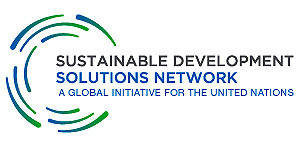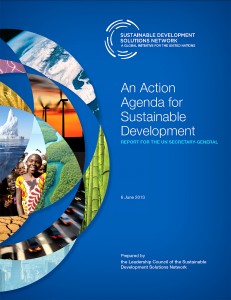2013-05-23: The U.N. Secretary-General, Ban Ki-Moon, announced the launch of the United Nations Sustainable Development Solutions Network (SDSN) on 9 August 2012.
UN SDSN is structured around 12 Thematic Groups of scientific and technical experts – from academia, civil society, and the private sector – who work in support of Sustainable Development Problem Solving at local, national, and global scales … and to identify and highlight best practices. They also provide technical support to the High-Level Panel of Eminent Persons on the Post-2015 Development Agenda.

The world has changed profoundly since the year 2000, when the UN Millennium Declaration and the Millennium Development Goals (MDG’s) were adopted by the United Nations. Four critical shifts make the coming fifteen-year period, 2015-2030, different from the MDG period, 2000-2015: (i) a drastically higher human impact on the physical Earth; (ii) rapid technological change; (iii) increasing inequality; and (iv) a growing diffusion and complexity of governance.
These problems will expand, dangerously beyond our control, without an urgent and radical transformation in how we organize society. The world now needs an operational Sustainable Development Framework which can mobilize all key actors (national & local governments, civil society, business, science and academia) in every country to move away from the Business-as-Usual (BaU) Trajectory towards a Sustainable Development (SD) Path. This Framework and the SDG’s identify the main objectives and strategies needed to transform from BaU to SD.
The purpose of the Sustainable Development Goals (SDG’s) is to help translate global aspirations into practical actions. In this regard, SDSN has subscribed to the ‘Rio+20’ Agreement that the SDG’s should be ‘action-oriented, concise and easy to communicate, limited in number, aspirational, global in nature and universally applicable to all countries while taking into account different national realities, capacities and levels of development, and respecting national policies and priorities’.
.
SDI’s Comments on the Draft ‘Action Agenda for Sustainable Development & Sustainable Development Goals’ …
[ Submitted by e-mail, yesterday (2013-05-22), to the U.N. Sustainable Development Solutions Network.]
1. The problems with this Draft Document, dated 7 May 2013, are fundamental and profound. Our Organization will be happy to assist the Network (SDSN) in improving the text.
2. At this time, however, we would like to bring to your attention some urgent overarching issues:
- Amend the Title … refer directly to the Sustainable Development Goals (SDG’s). See above.
- As drafted, the text does not show that … or explain how … there is a robust Interdependence between the different Sustainable Development Goals.
- Indeed, the scale and immediacy of the Sustainable Development Challenges are unprecedented. The Network (SDSN) must now, therefore, take the brave and difficult step of placing the Sustainable Development Goals in order of priority. Do not allow yourselves to be shackled by the approach taken in the earlier Millennium Development Goals !
- In this Document, All of the texts dealing with ‘Governance’ are ambiguous, weak and embarrassingly inadequate. References to the Institutional, Political, Legal and Judicial Aspects of ‘Governance’ are both necessary, and required.
- The word ‘access’ is used very often and very generally in the Document. BUT … in order for People with Activity Limitations (2001 WHO ICF) to ‘access’ facilities and services in the Built (including Virtual), Social and Economic Environments, and to be included and participate fully in their local communities … it is an ESSENTIAL prerequisite that those Environments are effectively ACCESSIBLE-FOR-ALL ! This concept is not mentioned once in the Document … a very serious omission.
.
.
Updates: 2013-06-07 & 2013-07-22 …
The SDSN Final Report is Fundamentally and Profoundly INADEQUATE !
Immediately below that … see Extracts from the Letter of Navanethem Pillay, United Nations High Commissioner for Human Rights, dated 6 June 2013 … addressed to All Permanent Missions in New York and Geneva.
 6 June 2013 – Final Report
6 June 2013 – Final Report
UN SDSN’s ‘An Action Agenda for Sustainable Development’ (Final)
Click the Link Above to read and/or download PDF File (1.91 MB)
————
” Twenty years ago this June, the World Conference on Human Rights convened at Vienna to forge a new vision for our world, one founded on a recognition of the fundamental interdependence between democracy, development and human rights. In the tail of a blood-stained and deprived century, the whispered call was for dignity, equality, justice, rights. And what began as a murmur in Vienna grew in volume and force with each global conference: Copenhagen and Beijing in 1995, Durban in 2001, New York in 2005 and again in 2010, and Rio in 2012. In recent years, the murmur has become a roar, echoing across societies on all continents, from victims denied redress, older persons denied respect, youth denied hope, and activists demanding a better way. From this call, we have learned much about the imperatives of sustainable development. There will be no development without equality, no progress without freedom, no peace without justice, no sustainability without human rights.”
“All that is required is the political will to move beyond the failed approaches of the past, to chart a fresh course, and to embrace a new paradigm of development built on the foundation of human rights, equality and sustainability.”
1. The Post-2015 Agenda must be built on a human rights-based approach, in both process and substance.
2. The new agenda must address both sides of the development challenge – that is freedom from both fear and want.
3. The imperative of equality must underpin the entire framework.
4. Marginalized, disempowered and excluded groups, previously locked out of development, must have a place in the new agenda.
5. We must commit to ending poverty.
6. The new framework must advance a healthy environment, as an underlying determinant of internationally guaranteed human rights.
7. The Universal Declaration of Human Rights guarantees the right to an international order in which human rights can be fully realized. Similarly, the UN Declaration on the Right to Development mandates international reform to ensure human rights-based policy coherence at the international level. In the wake of the global financial, food, climate and energy crises, and in the context of growing disparities and historic governance failures at all levels, the credibility and effectiveness of the Post-2015 Agenda will therefore depend also on the degree to which it addresses this pressing need for human rights-based reforms at international level.
8. The Post-2015 Agenda should be universally applicable.
9. The Post-2015 Agenda must include a strong accountability framework.
10. In the wake of the devastating global financial crisis, and revelations of abusive business practices in all regions, it is clear that responsibility for human rights-based development in the Post-2015 period must extend to actors in the private sector, as well.
6 June 2013 – United Nations OHCHR, Geneva
‘Human Rights in the Post-2015 Agenda’ – Letter from the UN High Commissioner for Human Rights to All Permanent Missions in New York and Geneva
Click the Link Above to read and/or download PDF File (642 Kb)
.
.
END







